|
It's here - at last!
PRIDE AND PREJUDICE x THE DIFFERENCE ENGINE This Jane Austen-style steampunk SF novel ("Austenpunk") has it all: romance, adventure, intrigue, action, philosophy.
Buy it today, Kindle or paperback - or read it for free with Kindle unlimited!
~~~~~ Get it on Amazon ~~~~~ #BeholdTheRevolution
2 Comments
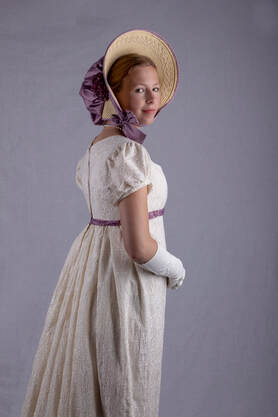
Imagine England toward the end of the 18th century, now subsumed by advanced technology.
Three decades ago, a pair of engineers by the names of Briggs and Kleinman discovered how to form a clockwork engine with vast potential. The application of their discovery began immediately. Before anyone could even register the change, Britain had become a gear-driven nation. Business began to spring up all over, inventing new and exciting ways to implement the technology, making lives more convenient. After mergers and acquisitions, four companies became dominant in the industry. So quick was their rise that the government was unable to protect against their influence. Soon, the Big Four were the ones truly running the country. In the midst of all this, along comes Henrietta Casterbridge. Hattie (as she is known) is on a crusade. These dreadful machines have become far too great a presence in the modern life. Her father knew it, gave up his business in the industry to do his best to limit their influence - but his tragic passing left his daughter to continue in his stead. In a world where women have no standing, Hattie cares not for her mother's insistence upon her finding a husband but instead is fixated on bringing down the clockwork oligarchy that has England in its gear-driven clutches. But then there is Mr Somersby... This handsome entrepreneur always seems to be in Hattie's way, somehow, with his egotistical and sarcastic comments. She would love to be rid of him, of course, wouldn't she? Of course. Yes, of course. But together, the two of them make a discovery that could change everything, and their tense situation becomes an immediate danger. Coming soon: "Cogs and Cognizance". You won't want to miss it! 
Since it's been so long, I figure you guys deserve an update on where I'm at.
First and foremost: Cogs and Cognizance is coming out very soon! By the end of the month, if I can swing it. (Early September at the latest.) This is good news. Why did it take so long, after my supposed renewed focus last year? Well, for a lot of reasons. It took some time to get feedback from my beta readers - everyone's busy, you know. And then, as I was getting into the middle of my rewrite, we got a pandemic. You might have heard of that COVID-19 thing, perhaps. But besides my workplace getting much busier due to all that, leaving me less time and a lot less energy to write, I also fell back into a bit of anxiety. My old nemesis... There's a lot going wrong with the world, and this event just tipped me over the edge. But I got back in, and have the text finished and ready for publication! So what about The Sleepwar Saga? Ah, well, that's a little tricker. 
Some of you may recall that I was several chapters into the first draft of "Shadow Cabinet" when my first huge anxiety issue happened a few years ago. I was finally gearing up to dive back in when I was forced to reconsider.
You see, four of the remaining six books I originally had planned were due to feature people of color as the POV characters. Folks who had been in the first two books, but not had their "feature" book yet. Recently, though, many authors of color have been asking white authors not to write books from their POV. For many reasons, all of which I am sensitive to. For example, we tend to just "do it wrong" and be so inauthentic that as a best result, POC are required to put in a huge effort as sensitivity readers to get it back on track. And that's the optimal (rare) outcome. Plus, even for self-pubbers like myself, we're taking up "real estate" - making it harder each time for authors of color to get published. And/or clouding the reading field with takes on their culture that make potential readers used to our inauthentic approach, leading publishers to not want real stories about people of color to be published, as they don't feel like it's what the audience expects. I've followed the discourse, I respect it. I know there are multiple viewpoints, but I don't want to cause harm where it isn't necessary. And so, I have felt the need to totally revamp my approach to the remaining books in the series. No longer will each of the six leads have a POV book - and the series will be shortened to four installments. This way Kaz & Andy will each get two POV books to themselves. I will not be reducing the presence or effectiveness of my characters of color throughout this, though - don't worry! I will still strive to make them real, active, and vital. But I can't try and "tell their story", not through their eyes. Not in any way that tries to seem as though I can "speak for" their experience to which I can't relate. So two more books will be coming. I have lots of great ideas about Book 4, which should be improved now that Andy is the POV character. As the team's leader, he has a lot to do in the finale, and it just makes sense to have him tell this chapter of the story. It's Book 3 - "Shadow Cabinet" - that will need the most reworking. Meesha should still get a lot of development in this - and Jason with her - but it will have to take a little twist so that it needs to be told from Kaz's point of view. I have ideas, this can be done well. Just might take some time to get right, so hold on for a bit. But it's coming! Possibly the next thing from me will be the first installment of The Casebook of Detective Moriarty - but that is a discussion for a later time. For now, prepare to hear all about Cogs and Cognizance - coming very soon! 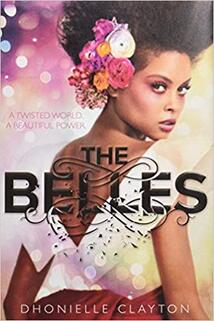
Writing advice. There's so much of it out there – most of it well-intended – but how much of it should you heed, as a writer yourself?
In reading Dhonielle Clayton’s novel The Belles, I was struck by the fact that the poor beginning to an otherwise enjoyable novel (so far: I’m about half-way through, and was 1/3 through when I first wrote and then accidentally deleted this blog post I’m trying to conjure back up) appears to have been affected by too-closely following an oft-heard piece of writing advice. “Start when the story begins.” Have you heard that one before? That, or something like it? When trying to find the place to start your novel, drop all the boring stuff of the character just living their life, and start when things actually begin to change for that character. Makes sense, right? No one wants to read a book that begins with chapter upon chapter of mundane tasks and routine interactions. Skip ahead to the part where the story happens! But that brings up a problem: for the protagonist’s new situation to have any impact, we must first have a sense of where he or she came from. We can’t empathize with the character being overwhelmed or challenged by change, without first seeing the status quo which is being changed. So what was that about The Belles? Let me explain, with minimal spoilers all from the first couple of chapters. Camille is a “Belle”, and is on her way to the debut where she and her friends will take up their new positions after lifelong training – and nothing will ever be the same again. But, with the character enclosed in a private chamber, the novel takes the opportunity to explain the world, the rules, and the history of the character. It takes several (short) chapters just to get us to (and through) this brief display Camille must put on at her debut. Why such a lengthy process for such a short event? Because of all the backstory which must be communicated. For it is, of course, very necessary to know why Camille is here and what she has been through. And since the book is starting where the story begins, this must all be revealed through info dumps. Worse than that, however, is Camille’s relationship with a fellow Belle named Amber. The text drills into us how fond the two are of each other – all while showing through action and dialogue that the two are incredibly hostile to one another. In between insults or antagonism, the prose (inside Camille’s head) stresses their closeness. But that’s not what we see. What the reader experiences is the two characters being hostile and nasty. This is not merely “show vs tell” – this is “show” in direct opposition to “tell”. But because of the nature of the event and the competition taking place, this love between the characters cannot be portrayed in the way that the narration would have us accept is true. So what could have been done instead? Well, obviously, taking us back and showing us the training these girls went through, the hardships they endured together on the way to this moment, the closeness they shared, would have allowed us to experience both the world which the Belles are leaving, as well as the real love between them. But the story is not about their training. Should Clayton have wasted book space giving us a sense of all of this instead of cutting to the actual story she is intending to convey? It’s a tricky thing. Was she (or her editor) wrong in taking the advice to “start where the story begins” so strongly to heart? If the writer begins at the change in environment or status, the reader loses out on much needed context for this transition. On the other hand, if the writer begins before this, valuable storytelling time is taken up conveying things which have nothing to do with the location, theme, or even characters, of the main storyline. So what is the solution? Well, as with anything it is not that easy. But the book The Belles puts me in mind of another “Belle”, so let us look briefly at the Disney animated classic movie Beauty & the Beast. 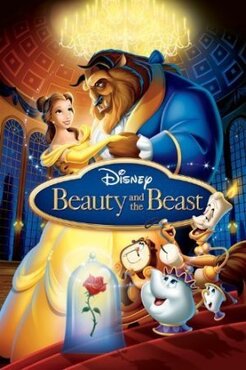
If the animators took that old writing advice literally, the movie would begin with Belle’s father having gone missing, and her hunt for him which brings her to the house of the Beast. After all, this is where the story begins, is it not? This is where the change in her environment, her status, her wellbeing, all begins to unfold?
Well, sure, but what would we feel about any of it if we did not first see Belle’s mundane life and the happiness she experiences living in her father’s house? None of what she endures or is transformed by would mean anything without first seeing where she comes from and what she desires. Which is why (after a storybook prologue) the movie actually begins in that little village with Belle singing a classic “I want” song about how she desires “much more than this provincial life”. She is happy with her father, and the friendly townspeople, but a surface pleasantness is not enough to satisfy Belle. She wants something deeper. Contrasted with this, we see Gaston who declares that Belle’s surface beauty has established her as “the best” girl in the village. To him, outward appearance and superficial pleasantness are all which is important. This puts him in direct conflict not only with Belle personally, but with her worldview. And more to the point, it is this very conflict around which the entire movie will pivot. Not only involving Gaston, but thematically throughout the whole story. That what lies beneath the surface – even if it is not superficially pleasant – may be the most valuable and attractive thing of them all. So even before Belle’s change in circumstances, her conflict has already begun. The theme, the idea which the story is built around and will explore in various ways, is introduced and made central. Because that is the story – that, not the plot which will help in bringing it to life. It is not the plot which must begin at the start of your book, film, play or epic interpretive dance. It is the story. So even as you introduce the status quo which you (the writer) are about to upend dramatically, the theme and conflict which this story is built around must be front and center, driving everything in the narrative. How to go about doing this? Beats me, guv. I just work here. 
So, yeah. Hi. Wow!
Been quiet around here, hasn't it? Let me explain. Around the time I made my last blog entry, I lost my job. Not the end of the world (there are many jobs out there) but as it was from a company I had worked at for almost 17 years, I was at a bit of a loss. I tried to keep up my writing - but the stress made it impossible for me to focus on my novel. "Shadow Cabinet", Book 3 of The Sleepwar Saga. I put enough pressure on myself in my writing as it is; the financial burdens I was suffering under did not help this any. So, I put it aside. For a bit. Just until I recovered. I was having severe anxiety episodes, unable to really even leave the apartment for a while. Not good stuff. But I intended to return. With each passing day, however, it became more and more obvious that I wouldn't be able to get stuck back in any time soon. The longer I left it, the more pressure I felt on the subject. I could/can barely hop on Twitter - which is my writing account - because I instantly feel that anxiety. Because I have associated that feeling with this book. With my writing "persona". This mess all happened at the time I was making inroads to the third book in my series, and all of the feelings and the trauma are tied into that. Into me as a writer. Oh, I've kept up writing. Sort of. Not wanting to fall out of the habit, I began to bash out quick short stories that barely held together - just to maintain my abilities. Nothing of any quality - but some were decent enough for me to put out into the world under a pseudonym, and have received a small response. Yet still, every time I think about my "real" books, or my official authorial presence on Twitter, I feel the bite of that anxiety. Seizing my heart, pounding inside my head. Enough is enough. I want this feeling gone. I want to get back to the stories I love. 
So, right now I am in the process of rereading (and making minor tweaks to) the first draft of "Cogs & Cognizance" (a clockpunk Jane Austen tribute) before sending to beta readers. And once it's out there, I fully intend to get back to the draft of "Shadow Cabinet".
My boss at work has recently devoured the first two books in The Sleepwar Saga, and that gives me courage. I want to do this. I can do this! By the end of 2019 I will have "Cogs & Cognizance" out on Amazon - and at the very least will have "Shadow Cabinet" with beta readers. Though I'd love to have the final draft done by year's end, too. This I swear, and putting it on the internet makes it true and official (or so I hear). Welcome back to my world! I've missed you all.
I wrote a previous blog post about how "likeable" your protagonist needs to be. But does the audience actually need to empathize with the character at all? And to what extent? That's what I want to think about today. I dealt last time with characters who were evidently despicable, and how the writer (or director, in the case of movies) gets the audience onside anyway. But what happens when you don't want the audience necessarily onside? Is that okay? Does that work? What does it mean, anyway? Let me explain with a cinematic example, and the one that originally got me thinking along these lines several years ago: The Social Network. 
Obviously a much-lauded film. But many critics and viewers complained that the main character (Facebook-creator Mark Zuckerberg) was not sympathetic. The audience had nothing to latch onto with him, no reason to care.
When I heard this criticism, it fascinated me because I had never thought about it when watching. True, for the most past Zuckerberg is someone you simply cannot empathize with because he acts brashly and gives no insight into his feelings and motivation. But the movie never asks you to empathize with him. "Sympathize"? Yeah, a little bit - mostly right at the end. But it never once expects the audience to actually be on board with the character, to be on his side, to experience things through his interpretation of the world. And I never minded. They successfully (as far as I was concerned) presented a movie which only expected the viewer to find the character interesting, and never to relate to him personally. And it's true that this is rarely attempted. 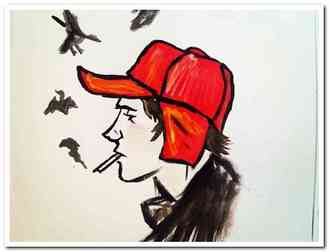
Your mileage may vary, of course, but I never once found Holden Caulfield in "The Catcher in the Rye" relatable or at all likeable. He was kind of a brat, and a nihilistic one at that. But I loved reading his perspective on the world.
I didn't empathize with it, didn't agree or "like" his thoughts and actions. But it was fascinating to read all of this from his point of view, to experience that perspective for a short time. It was OK that I wasn't "on his side"; I was intrigued and entertained. Surely some skill is needed to be able to pull this off. I get that. But as I head into writing Book 3 of "The Sleepwar Saga" I am faced with writing from Meesha Wallace's perspective, and wonder how far I ought to go. Up until now, she's been standoffish, snarky, sarcastic and savage. But can I carry that through to her POV, or will readers turn tail and run? How much should each quip be countered by an internal thought questioning herself as to why she drives everyone away? Ought her bitterness to be offset by some internal sweetness? Yes, the character will learn and grow along the way, but do I need the audience to be "on her side" from the outset? Or might they be intrigued enough by her way of thinking to be along for the ride regardless? Clearly, I have some pondering to do. 
Look, there's thing out there where people will judge a work by whether they perceive it to be "character-based" or "plot-based".
And I'm not even saying these things don't exist. Some stories genuinely are only really concerned about the interesting events, and some barely have anything happen because it's all about the development of these interesting people. That's okay. But most stories don't fall into such extremes. And also, neither category is inherently "better" or more "worthy" than the other, regardless of what some book snobs will tell you. (And I say this as someone largely unconcerned, as a reader, with plot.) Realistically, though, most good stories have an engaging plot and interesting characters who develop as a result of that plot. So which comes first: the chicken, or the egg? See, here's the thing: it doesn't matter. Seriously, it doesn't. When done correctly, no one ought to be able to tell which you (the writer) began with. My own stories tend to begin with "concepts" rather than either one of the above, but for the sake of argument, let me give an example of beginning with the story. (And, yes, my example assumes the writer is an outliner first. This doesn't matter either - whether you shape the story perfectly beforehand, during, or after the fact, makes no difference. But I have to choose one of the options for my example.) Let's say that you invent a plot idea about a far-off world where a slave class is made up of people born with blonde hair. (I'm not saying this is a great idea - I'm not gonna throw those away on a blog post!) The plot would be about an uprising of these blonde chattels against their dark-haired oppressors. Decent start. But then you have to decide who these people are. And if you're doing it "right" (I hesitate to use "right" and "wrong" but here I go anyway) then your characters will be chosen in such a way that their defining details suit the plot. That is to say, your characters' personas are designed to facilitate the plot. You want someone who begins this uprising, so they need to be a character with an innate sense of pride that cannot be crushed by the prevailing attitude of both the masters and their fellow slaves. You probably also want a major character who is more submissive - maybe you want them to work against the main character, maybe you want them to be talked around. Either way, the characteristics of this person will suit the needs of the plot. Everything about the unfolding of this plot will depend on the nature of the characters, and their story of progression will be what drives the main plotline. Ideally, you want the plot and the story (the development of your characters) to be one and the same. To unfold together, thematically tied. So that's one way of doing it. The other? Let's suppose you have imagined a character who you believe is a proud human being despite oppressive circumstances. You want a figure with certain characteristics of untapped leadership potential, someone with strong beliefs that will thrive under challenge. 
Okay, you have an interesting character there. But if the plot is merely about a barista who is sick of their day-to-day grind, this may not fit the potential of your character. All of that beautiful and noble design work you put into the personality is untapped.
So no, instead you realize that this person needs to be downtrodden, perhaps a slave. Maybe part of a race of slaves. And to bring out the unfair nature of this oppression, you want to highlight how arbitrary this enslavement is. What if they live on a world where all children born blonde are considered inferior, property of the state? This will emphasize the unfair nature of the situation, and further facilitate the readers' engagement in the character's growth. You see where I'm going, right? Both approaches result in an identical end product. Because both plot and character should be telling the same story. Whichever was conceived of first, when developed (through planning, through the act of writing, through rewriting) they should be inseparable. The characters suit the plot; the plot suits the characters. Inventing a plot first doesn't mean a tale with pointless characters. And creating the characters first needn't result in a work without an exciting plot. The two ought to be entwined, so reliant on the other that in the end no reader can tell which was conceived of before the other. That's when you know that you have succeeded at writing the story.
Hi guys!
I won't post to the blog every time I add a vid to my channel, but I started experimenting with the "share" button on the PS4 to do some PSVR videos, and wanted you guys to check it out if you were so inclined! It's a brief introduction to "Fruit Ninja VR", with me performing absolutely atrociously. Have fun!
From December 19-December 23, you can get my short story/novelette free as a Kindle e-book!
Trapped in a maze. Surrounded by ghosts. Very, very hungry. Follow Pak Hee-Joon as he investigates the strange maze he finds himself in, tries to figure out how he got here and what he must do to escape, and fights for his life against the evil spirits that dwell within. Four ghosts, myriad little white gems to collect, randomly appearing fruit, and power-ups that turn the tides against his spooky enemies - for a limited duration. If any of that sounds familiar, this might be the short story for you! 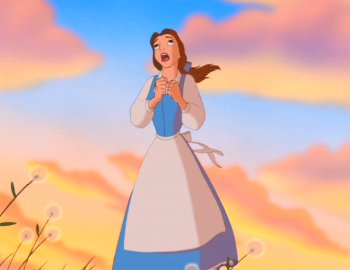
The point early on in a musical where the lead character sings a song that clearly lays out for the audience what his/her goals and dreams are, is an important and necessary development in the story.
For most of us, we will be especially familiar with the way Disney has used the technique in its animated movies, so for the sake of reference I will use a few of those to explain what I mean about "I want" songs. But hold up: how can I use a song in my novel? Well, obviously I can't. But the basic technique of making sure the character and longings of my protagonist are laid bare for the reader is a sound one, that I should be paying more attention to. There is, of course, the pretty basic "I want more" song. That specific line is used in both Ariel's "Part of Your World" and Belle's "Belle" (The Little Mermaid and Beauty and the Beast, respectively). It is just a declaration of: "I want my life to be better and bigger than this." And yet... Ariel has a purpose in hers. She doesn't just want "more", she wants something specific. From afar, she has observed these humans on their ("what are they called? Oh yeah... 'feet'!") and longs to experience that specific other world. With this setup, the movie goes on to show her both the joys and the drawbacks of becoming "part of that world". But Belle? What does she long for? "I want much more than this provincial life." As much as I love her, the song, and Beauty and the Beast (still Disney's best movie) this song does a less good job of setting the stage. It comes across as little more than Belle thinking she is "better" than the other people in her village, and just wanting... something. What exactly? How does this help us understand her goals, and the theme of the movie? At least Rapunzel's "When Will My Life Begin" from Tangled shows us the nature of her confinement, the accomplishments Rapunzel has been able to attain, her interests and resourcefulness, in the process of revealing that she has just been biding time until her real life can start. The specific goal is not defined, but other aspects of the character are. One of the best "I want" songs (from, ironically, one of my least favorite Disney animations) is "I Just Can't Wait to Be King" from The Lion King. Here, Simba is showing that he is a little brat who wants control over his situation and over other people. He wants to be free to do what he likes, and for no one to have power over him. It sets out the stall for Simba, showing that he is still young and selfish and does not understand the way the world works. Most importantly, he has forgotten that he will not be king until the old king (his father) dies. This song sets us up for Mufasa's imminent demise, and Simba's flight from the destiny he had so recently pined for. The best kind of "I want" songs do not only reveal character and desire, but set up the movie (or play, of course) itself. Show the audience what the movie will be about. Which brings me back to my books. How can I use this technique in my novels? Well, I'm not sure yet - which is why I'm exploring this topic here today! But I think that the general notion should translate well to books. Within the first few chapters (preferably the first few pages) we should get an "I want" song. (Albeit in prose form.) We should see something which reveals to us not only the protagonists goals and desires, but the direction which the book will take. The themes which will develop along the way. 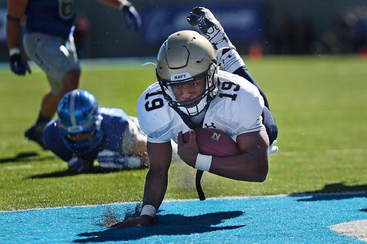
I think I by and large managed this in the first chapter of "Red Cross". The book begins with Andy Flashman musing on his future as he impatiently awaits scholarship results which will decide his college future, and whether he can pursue his dream of being a professional football player.
Will the book be about him becoming a football player? No! But showing his preoccupation with the shape his future might take, and his powerlessness in awaiting someone else's decision that will define it for him, sets up the basic theme and direction for this book. Andy's future is at stake, and he wishes he personally had some impact over what the shape of it might be. This manifests in a completely different way in the Sleepwar, and the book ends with a kind of reversal of those opening moments. But "Straw Soldiers"? Not so much. I love that book, and the opening scene shows us Kaz's personality and her abilities, her traits - the things which will embroil her in the plot and decide her role in the events that unfold. But what does she want? What, specifically, are her desires and dreams and ambitions? How do those things impact the way in which the plot will take place? This is not presented - or, at least, not in a clear and concise way which the reader can take in and understand right up front. There's a lot of good stuff in that book, and I think it ultimately works, but giving Kaz a good "I want" song would have given the reader a better connection to her, and a better investment in the progress of the plot and story. When I go back to redraft "Cogs & Cognizance" (the novel I am currently working on) this is an issue I will need to take seriously. How best to present to the reader exactly what Hattie desires, why she does not yet have it, and what stands in her way. And exactly how the book is going to give us these things, but in a way the character does not yet expect. |
J Douglas BurtonAuthor of "The Sleepwar Saga" YA fantasy series. Also Victorian pulp SF series "The Star Travels of Dr. Jeremiah Fothering-Smythe". Archives
August 2020
Categories |
Proudly powered by Weebly


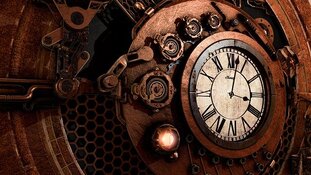

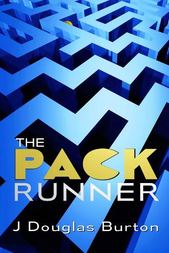
 RSS Feed
RSS Feed